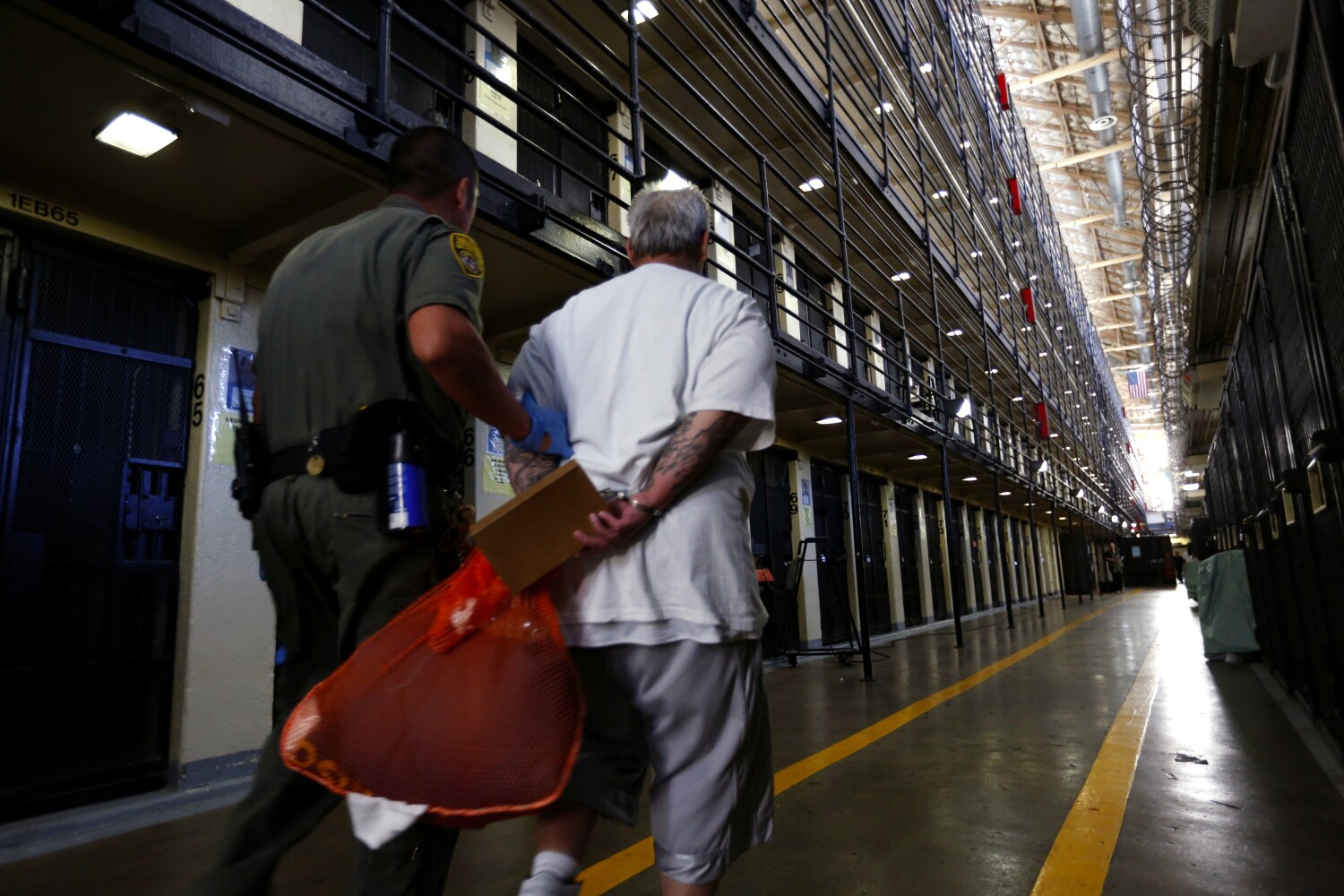[ad_1]

San Quentin State Prison is facing the largest single penalty in the state over workplace safety violations for failing to prevent the spread of COVID-19, resulting in the deaths of 28 inmates and one correctional officer and a total of 2,200 confirmed cases.
California’s oldest penitentiary was slapped with a $421,880 fine based on a June inspection that found numerous violations, including failing to report deaths and injuries in a timely manner and failing to isolate new arriving inmates infected with the virus, according to a report by the California Division of Occupations Safety and Health. The fine is nearly double the highest ever issued to any facility.
The Cal-OSHA report, issued Thursday, comes on the heels of a scathing State Inspector General’s report that found health officials with the corrections department ignored warnings of front-line health workers and pressured them to hastily transfer 189 potentially coronavirus-infected inmates from the California Institution for Men in Chino last May, triggering a deadly outbreak at San Quentin.
By the end of August, 2,237 inmates and 277 staff members had been infected at San Quentin, according to the inspector general’s report. The California Department of Corrections and Rehabilitation (CDCR) and California Correctional Health Care Services were blamed for creating a “public health disaster” at the prison.
One state lawmaker called it the most deadly medical mistake in the history of the California prison system. In all, 199 inmates have died statewide among more than 48,000 who tested positive for coronavirus. Six state lawmakers have called for the replacement of J. Clark Kelso, a federal receiver who oversees the prisons’ healthcare agency.
“Cal-OSHA determined the San Quentin staff were not provided adequate training or equipment for working with COVID-19 infected individuals and employees who had been exposed to [virus] positive inmates were not provided proper medical services, including testing, contact tracing and referral to physicians or other licensed health care professionals,” the agency said in a statement. Avenal State Prison also received a fine of $39,900 for its failure to maintain an effective “aerosol transmissible disease control exposure program” and other violations
The safety agency’s 33-page report found that the prison’s open tiers proved the ideal environment for the virus to spread. The report included 10 citations.
Among the report’s findingswere that the prison failed to report hospitalizations or deaths in a timely manner; lacked a biosafety plan, an exposure plan and adequate protective equipment for workers; that those handling the most infected did not get sufficient respiratory protection, and that some areas of the facility lacked running water and cleaning materials.
In response, the CDCR said the prison had already made many improvements and had “remedied several of the citations in the eight months since Cal/OSHA visited the institution.”
Since the inspection, department officials noted its representatives have worked with the safety agency to address each concern. CDCR officials noted that they have detailed plans to control the spread of the virus, that staff has been extensively trained and that every inmate and employee is now provided with an N-95 mask.
Earlier this week, the son of a correctional sergeant who died of COVID-19 conditions after working at San Quentin told The Times that “higher-ups” in the system failed his father.
“Now all of a sudden they are doing everything they should have been doing since the beginning, now that they are scared,” Army Spc. Vincent Polanco, whose father, Gilbert Polanco, died of COVID-19 in August. “It really hurts me to see that leadership really messed up and didn’t take the initiative to save my dad’s life.”
His remarks came after the state inspector found the transfer of inmates from Chino was “deeply flawed and risked the health and lives of thousands of incarcerated persons and staff,” the report noted.
By relying on outdated test results, the Chino “prison had no way to know whether any of the incarcerated persons were currently infected with the virus,” the report said.
The transfers from Chino came after corrections officials and lawyers representing inmates agreed the men had to be moved from the prison’s barracks-style housing, where the virus was spreading quickly.
At the time of the moves, the Chino prison reported more than 600 cases of COVID-19 and nine deaths. The 189 were among 700 inmates selected for transfer who had medical conditions that made them especially vulnerable to the virus.
The night before the first transfers, a supervising nurse emailed to alert a medical executive that some of the inmates had not been tested for nearly a month — far too early to be an effective gauge of infection.
“Is there a re-swabbing criteria to be met before transfer,” the nurse asked, suggesting that retesting was called for.
“No re-swabbing,” the executive replied 11 minutes later.
Two of the inmates had COVID-19 symptoms on arrival, including one with a fever of 101.1 degrees. But even though the San Quentin health staff suspected that the Chino inmates had been exposed to the coronavirus, the prison housed 119 of them in a unit that lacked solid doors, which allowed air to flow freely through the cells.
By the time COVID-19 test results came back, 14 infected inmates had been housed in the unit for at least six days, the report noted.
“The virus spread quickly, both to the other incarcerated persons who transferred from the California Institution for Men, as well as to the 202 incarcerated persons already housed in the same unit,” the report said.
By Aug. 6, more than half of the inmates in the unit had tested positive. Of the 122 newly arrived Chino prisoners, 91 eventually tested positive, and two died from complications related to COVID-19. In September, lawyers for the family of 61-year-old Daniel Ruiz filed a government claim, a precursor to a lawsuit against the corrections agency. Ruiz died July 11 after contracting the virus while serving time in San Quentin for a minor drug crime.
[ad_2]
Source link